- Home
- Rosamunde Pilcher
Sleeping Tiger Page 5
Sleeping Tiger Read online
Page 5
“The bad weather has been in the Mediterranean for days.”
“Is it always like this in March?”
“No, it can be warm in March.” And, as if to substantiate his words the sun, at that moment, chose to filter through a gap in the clouds and paint everything in a thin golden light. “Over there,” Toni went on, “that is the town of San Antonio. The cathedral on the top of the hill is very old, a fortified cathedral.”
“Fortified?”
“Against attack. From the Phoenicians, and Pirates, and Moors. For centuries the Moors occupied San Antonio.”
The town lay like a frieze against the backdrop of the sea. A hill of white houses, topped by the soaring towers and spires of the cathedral.
“We’re not going through San Antonio?”
“No, we are on the road to Cala Fuerte.” After a little, he added, “You’ve never been to the island? And yet your father lives here?”
Selina watched the slow-moving sails of a windmill. “No. No, I’ve never been.”
“You will like Cala Fuerte. It is small, but very beautiful. A lot of yachtsmen go there.”
“My father is a yachtsman.” She said it without thinking, but the words caught at her, as though to say a thing, to speak it aloud, makes it real, and true. My father lives at Cala Fuerte. At a house called the Casa Barco. He is a yachtsman.
The clouds continued to spread and part and the sun drove between them and at last they began to roll out to sea where they lay, sullenly, on the edge of the horizon. The island was bathed in warmth. Selina pushed up the sleeves of her sensible jersey dress and rolled down the window and let the scented dusty wind tear at her hair. They passed through little villages, and gold stone towns, shuttered and quiet. Doors of houses stood open, hung with curtains of chain, and on the pavement old ladies sat, upright in kitchen chairs, talking or watching their little grandchildren, their worn hands busy with embroidery and lace-making.
They came to Curamayor, a sleepy town of creamy houses and narrow streets, and Toni rubbed the back of his hand across his mouth and announced that he was feeling thirsty.
Selina, not quite sure what was expected of her, said nothing.
“Some beer would be good,” Toni went on.
“I … I would buy you a beer, but I haven’t any money.”
“I will buy a beer,” said Toni. The narrow street opened into a large cobbled square, with a tall church, and shady trees, and some shops. He cruised gently round until he saw a café which met with his approval. “This will do.”
“I … I’ll wait for you.”
“You should have something too. Driving is hot and dry. I will give you a drink.” She began to protest, but he only added, “Your father will pay me back.”
She sat in the sunshine at a small iron table. Behind her, inside the bar, Toni was talking to the proprietor. A small gang of children, fresh from school, approached. They were delicious, in blue cotton pinafores and spotless white socks. They all seemed beautiful—the little girls pin-neat with braided dark hair and gold rings in their ears, their limbs olive-gold and perfectly formed, and when they smiled, their teeth showed pointed and white.
They saw Selina watching them, and were convulsed with giggles. Two of the little girls, more forward than the others, stopped in front of her, their grape-dark eyes dancing with fun. She longed to make friends, and on an impulse, opened her bag and took out a propelling pencil, never liked, about three inches long and with a tassel of yellow and blue. She held it out, inviting one of them to take it. At first they were too shy, and then the little one with plaits, tentatively, as though it might bite, removed it from Selina’s palm. The other, with a gesture wholly disarming, laid her own hand in Selina’s, as though she were bestowing a gift. The hand was chubby and smooth and wore a little gold ring.
Toni came back through the chain curtains with his beer and an orange drink for Selina, and the children took fright, and scattered like pigeons, running and taking the tasselled pencil with them. Enchanted, she watched them go, and Toni said, “The little ones…” with as much pride and affection in his voice as if the children had been his own.
Their journey continued. The character of the island had, by now, completely changed, and the road ran along the base of a range of mountains, while to seaward the fields sloped down in a shallow curve towards a distant misty horizon. They had been on the road nearly three hours when Selina saw the cross, high on a mountain ahead of them, silhouetted against the sky.
“Where is that?” she asked.
“That is the Cross of San Estaban.”
“Just a cross? On top of a mountain?”
“No, there is a very big monastery. A closed order.”
The village of San Estaban lay at the foot of the mountain, in the shadow of the monastery. At the crossroads in the centre of the town a sign pointed, at last, to Cala Fuerte, the first that Selina had seen. Toni swung the car down to the right, and the road sloped before them, running downhill through fields of cactus and olive groves and clusters of scented eucalyptus trees. Ahead the coast seemed thickly wooded with pine, but as they drew near, Selina glimpsed the white of scattered houses, and the bright pinks and blues and scarlets of the flower-filled gardens.
“Is this Cala Fuerte?”
“Sí.”
“It doesn’t look like the other villages.”
“No, it is a resort. For visitors. Many people have villas here, for the summer, you know? They come in the hot weather from Madrid and Barcelona.”
“I see.”
The pines closed about them, cool shadows and the smell of resin. They passed a farmyard, noisy with chickens, a house or two, a little wine shop, and then the road opened out into a small square, built around a single spreading pine. On one side was a shop, with vegetables piled at the door, and the window filled with rope-soled shoes, camera films, straw hats and postcards. On the other, white-washed to blinding brightness, was a house of Moorish curves and shadows, fronted by a paved terrace, furnished with tables and chairs. Over the door swung a sign, “Cala Fuerte Hotel.”
Toni stopped the taxi beneath the shade of the tree and switched off the engine. Dust settled and it was very quiet.
“We are here,” he said. “This is Cala Fuerte.”
They got out of the car, and the coolness of the sea-breeze was welcome. There were few people about. A woman came out of the shop to gather potatoes out of a basket and put them in a paper bag. Some children played with a dog. A couple of visitors, wearing home-knitted cardigans, and obviously English, sat on the terrace of the hotel and wrote postcards. They looked up and saw Selina, recognized her as a fellow-countrywoman, and hastily averted their eyes.
They went into the hotel, Toni leading the way. Beyond the chain curtain was a bar, very fresh and clean and cool, white-washed, with rugs on the stone floors and a rustic wooden stairway leading to an upper floor. Beneath the stairway another door led to the back of the hotel. A dark girl with a broom was placidly shifting dust from one side of the floor to the other.
She looked up and smiled, “Buenos días.”
“Dónde está el proprietario?”
The girl laid down her broom. “Momento,” she said and disappeared, soft-footed through the door under the stairway. It swung shut behind her. Toni went to hitch himself up on to one of the tall stools at the bar. After a little the door opened again and a man came in. He was small, quite young, bearded, with eyes like a friendly frog. He wore a white shirt and dark, belted trousers and a pair of blue espadrilles.
“Buenos días,” he said, looking from Toni to Selina, and back again.
She said quickly, “Do you speak English?”
“Sí, señorita.”
“I am sorry to bother you, but I’m looking for someone. For Mr. George Dyer.”
“Yes?”
“You know him?”
He smiled and spread his hands. “Of course. You are looking for George? Does he know you are looking for him?”<
br />
“No. Should he?”
“Not unless you have told him you are coming.”
Selina said, “It’s a surprise,” trying to make it sound like fun.
He seemed intrigued. “Where have you come from?”
“From London. To-day from the airport at San Antonio.” She indicated Toni, who was listening to all this with a sullen expression as if he did not like the command of the situation being taken from his hands. “The taxi-driver brought me.”
“I have not seen George since yesterday. He was on his way to San Antonio.”
“But, I said, we’ve just come from there.”
“He is probably home by now. I am not certain. I have not seen him return.” He grinned. “We are never sure if his car will make the long journey.”
Toni cleared his throat and leaned forward. “Where can we find him?” he said.
The bearded man shrugged. “If he is in Cala Fuerte he will be at the Casa Barco.”
“How can we find the Casa Barco?” The other frowned, and Toni, sensing his mild disapproval, explained. “We must find Señor Dyer, because otherwise I do not get my taxi fare paid. The Señorita has no money.…”
Selina swallowed. “Yes … yes, I’m afraid this is true. Do you think you could direct us to the Casa Barco?”
“It is too difficult. You would never find it. But,” he added, “I can find someone to take you there.”
“That is kind of you. Thank you so much, Mr.… I’m afraid I don’t know your name.”
“Rudolfo. Not Mr. anything. Just Rudolfo. If you wait here for a moment, I will see what I can arrange.”
He went out through the curtains, across the square and into the shop opposite. Toni slumped on his stool, his bulk sagging on either side of the inadequate seat, and his mood obviously darkening. Selina began to be nervous. She said, trying to placate him, “It’s annoying to be delayed, when you’ve been so kind.…”
“We do not know that Señor Dyer will be at the Casa Barco. They have not seen him return from San Antonio yet.”
“Well, if he isn’t, we can always wait a little.…”
It was the wrong thing to say. “I cannot wait. I am a working man. Time is money to me.”
“Yes, of course. I do understand.”
He made a sound as if to indicate that she could not possibly understand, and half turned his back to her like any overgrown and sulky schoolboy. It was a relief when Rudolfo returned. He had arranged for the son of the woman who ran the grocery store to take them to Casa Barco. The boy had a large order for Señor Dyer, which he was about to deliver on his bicycle. If they liked they could follow the bicycle in the taxi.
“Yes, of course, that will be splendid.” Selina turned to Toni, and said, with a brightness she did not feel, “And he will pay your fare, and then you will be able to go straight back to San Antonio.”
Toni did not look convinced, but he heaved himself off the bar stool, and followed Selina out into the square. By the taxi, a skinny boy waited by his bicycle. The handle-bars were slung with two enormous baskets, of the type used by all Spanish peasants. Badly-wrapped parcels of all shapes and sizes protruded from these baskets. Long loaves of bread, a bundle of onions, the neck of a bottle.
Rudolfo said, “This is Tomeu, the son of Maria. He will show you the way.”
Like a little pilot fish, Tomeu weaved ahead, down the white-rutted road that wound with the convolutions of the coast. The island was pierced with inlets of peacock-blue water, and above the rocks could be glimpsed delectable white villas, small gardens spilling with flowers, sunbathing terraces and diving-boards.
Selina said, “I wouldn’t mind living here,” but Toni’s mood was rapidly worsening and he would make no reply. The road was a road no longer, merely a lane winding between the mesembryanthemum-covered walls of other people’s gardens. It crested a slight rise, then sloped towards a final and much larger inlet, where a tiny harbour sheltered a few fishing-boats, and quite big yachts were moored out in deep water.
The lane ran down to the backs of houses. Tomeu, ahead of them, waited. When he saw the taxi edge over the crest of the hill, he got off his bicycle, laid it against a wall, and began to unload the baskets.
Selina said, “That must be the house.”
It did not look large. The back wall was white-washed and blank, except for a tiny slit of a window and a shuttered door, shaded by a thick, black pine. Behind the house the road branched, and ran to left and to right, along the backs of other houses. Here and there a narrow alley of stairs sliced down between the buildings towards the sea. There was a pleasantly haphazard look about it all, with washing flapping on lines and some nets put out to dry, and one or two skinny cats sitting in the sun and washing themselves.
Toni’s taxi bumped and slithered the last few yards, Toni complaining meanwhile that there would be nowhere to turn, his taxi was not meant for such bad roads, he would put in a claim if any of his paintwork was scratched.
Selina scarcely listened. Tomeu had opened the green shutter door and disappeared into the house, lugging his heavy baskets. The taxi lurched to a halt and Selina scrambled out.
Toni said, “I will go and turn and come back for the money.”
“Yes,” said Selina absently, watching the open door. “Yes, you do that.”
He accelerated so swiftly that she had to step back into the gutter to avoid having her toes run over, but when he had gone, she crossed the lane, and went, under the shade of the pine, cautiously in through the open door of the Casa Barco.
She had thought it would be a little house, but instead found herself in one large high-ceilinged room. The shutters were all closed, and it was dark and cool. There was no kitchen, but a small counter enclosed a galley, like a little bar, from the main living-space, and behind this she found Tomeu, on his knees, stacking the provisions into a refrigerator.
He looked up and smiled as she leaned over the counter. She said, “Señor Dyer?”
He shook his head. “No aquí.”
No aquí. Not here. Her heart sank. He wasn’t back from San Antonio, and somehow she was going to have to fob Toni off with excuses, and suggestions that he be patient, when neither of them had any idea for how long they would have to wait.
Tomeu said something. Selina stared uncomprehending. To show what he meant, he came out from the little galley and went over to the far wall and began to undo the shutters and fling them wide. A blast of light and sunshine invaded the house and everything sprang into colour. The south wall, that faced out over the harbour, was almost all window, but louvred double doors opened out on to a terrace, shaded by a split-cane awning. There was a low wall, and a few battered crocks and urns, containing geraniums, and beyond the wall, the shimmering blue of the sea.
The house itself was divided in a novel way. There were no interior walls, but the roof of the galley formed a little gallery with a wooden railing and this was reached by an open flight of steps like a ship’s ladder. Beneath the ship’s ladder another door led into a minuscule wash-room. A hole high in the wall provided light and ventilation, and there was a sink and a lavatory and a primitive-looking shower, and a shelf with bottles and toothpaste and stuff, and a mirror, and on the floor a round washing-basket.
The rest of the space was a lofty living-room of singular charm, white-washed, and with a stone floor, scattered with bright rugs. In one corner of the room was a wide triangular fireplace, filled with fragrant wood ashes, which looked as though they needed only the lightest puff of air to bring them back to burning life. The hearth was perhaps eighteen inches from the floor, just the right height for a comfortable seat, and this continued along the wall in a sort of shelf which was scattered with cushions and rugs, piles of books, a lamp, a piece of rope in the process of being spliced, a pile of papers and magazines and a box of empty bottles.
In front of the fireplace, with its back to the terrace and the sea, was an enormous sagging couch, with room for six and no trouble at all.
It was loose-covered in fading blue linen, and draped in a red-and-white-striped blanket. On the other side of the room, at right angles to the light, stood a cheap knee-hole desk, laden with more paper, a typewriter, an open box of what looked like unopened letters, and a pair of binoculars. There was a sheet of paper in the typewriter and Selina could not resist a peep.
“George Dyer’s New Novel,” she read. “The lazy fox jumped over the something or other hound.”
And than a row of asterisks and an exclamation mark.
She turned down the corners of her mouth. So much for Mr. Rutland’s hopes!
Between the galley and the door was a well, with a wrought-iron hook for the bucket and a wide shelf on which stood a half-empty bottle of wine and a cactus plant. Selina looked down and saw the dark gleam of water, and smelt it, sweet and good, and wondered if it was fit to drink; but Grandmother had always said you must never drink water abroad unless it was boiled, and this was no time to risk getting gastro-enteritis.
She left the well and came to stand in the middle of the room, looking up at the gallery. The temptation to investigate proved irresistible, and she climbed the ladder, and found a beguiling slope-ceilinged bedroom with an immense carved double bedstead (how had they ever got it up here?) placed, in state, beneath the high pitch of the gable. There was little room for more furniture, but a pair of sea-chests had been fitted in against the low walls, and a bulging curtain did duty as a wardrobe. There was an upended orange box for a bedside table, its shelves filled with books, and a lamp and a transistor radio, and a ship’s chronometer.
From the terrace Tomeu called “Señorita!” and Selina went down the ladder to join him. He was sitting on the wall, in the company of an enormous white Persian cat. He turned to smile at Selina, gathering up the cat in his arms as though to give it to her.
“Señor Dyer,” he said, indicating the cat, which mewed pathetically, and after a struggle, leapt lightly away, stalking into a sunny corner to settle itself in dignity, wrapping its tail around its front paws.
“It is very big,” said Selina. Tomeu frowned. “Big,” she said again, indicating with her arms a cat the size of a tiger. “Big.”

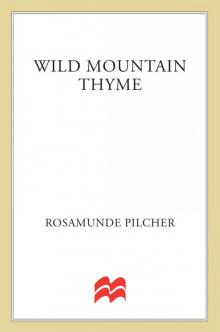 Wild Mountain Thyme
Wild Mountain Thyme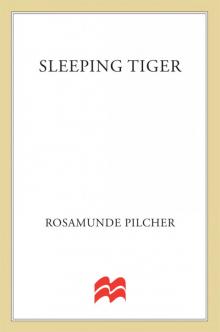 Sleeping Tiger
Sleeping Tiger Flowers in the Rain & Other Stories
Flowers in the Rain & Other Stories September
September The Blue Bedroom: & Other Stories
The Blue Bedroom: & Other Stories The Carousel
The Carousel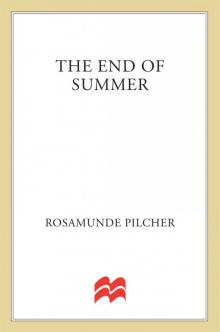 The End of Summer
The End of Summer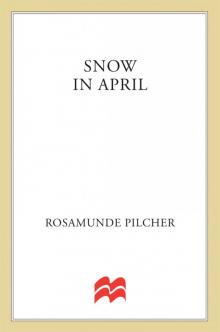 Snow in April
Snow in April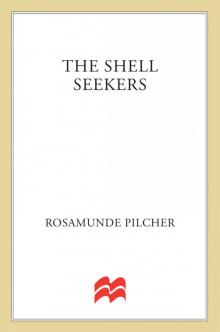 The Shell Seekers
The Shell Seekers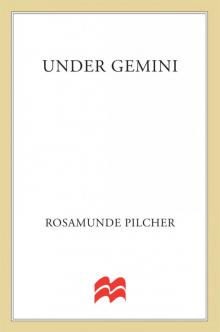 Under Gemini
Under Gemini The Empty House
The Empty House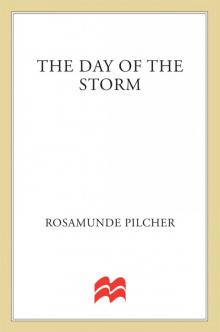 The Day of the Storm
The Day of the Storm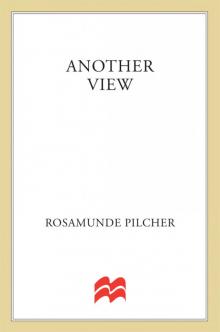 Another View
Another View Voices in the Summer
Voices in the Summer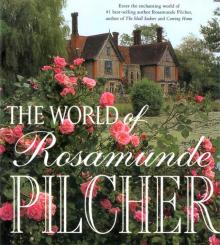 The World of Rosamunde Pilcher
The World of Rosamunde Pilcher Voices In Summer
Voices In Summer Blue Bedroom and Other Stories
Blue Bedroom and Other Stories